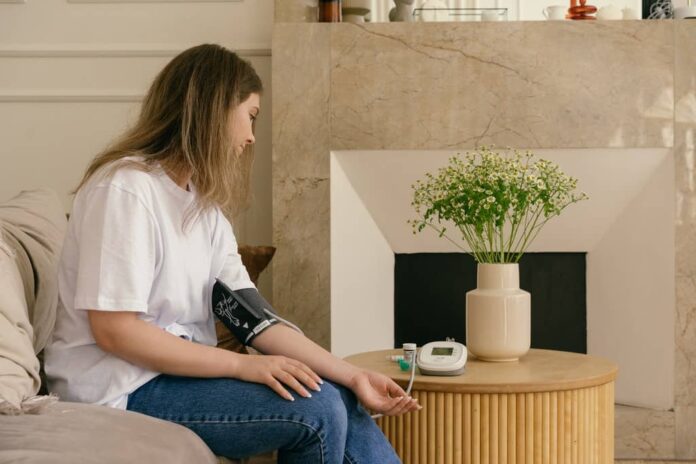If you’ve recently been diagnosed with high blood pressure, you may be concerned about taking medications to lower your blood pressure.
The way you live your life plays a significant role in treating hypertension. If you can manage your blood pressure through an active lifestyle, you may be able to decrease, delay or eliminate the requirement for medication.
Many people do not know What High Blood Pressure is. And that lack of knowledge could potentially lead the life serious health complications, stroke, heart attack and even end of life.
The term silent killer describes high blood pressure very easily. However, you can prevent this disease or reduce the damage high blood pressure can do with a little knowledge.
How To Prevent High Blood Pressure
Whenever your doctor checks your blood pressure, there are two readings. They are shown as 120/80. The beginning number is your systolic pressure. When your heart is pounding, the force of your blood in your arteries is called your systolic pressure.
This pressure is temporary which exerted as the blood is pumped. The second number is your diastolic pressure. As your heart pounds in between beasts, the force of blood in your arteries is more depressed. This is called your diastolic pressure.
Normal blood pressure is believed to be around 120/80 or lower. High blood pressure is believed close to 140/90 or higher, although physicians in different states have somewhat different perspectives on what constitutes low, normal and high blood pressure.
If you experience high blood pressure, then quite simply, you are in greater danger of suffering a stroke, heart and kidney disease. It pays to reduce your blood pressure in that instance.
Its inclination of matters that can cause high blood pressure is truly long. It includes physical inactivity, tobacco smoking and alcohol use, excessive stress and an inadequate diet.
Ask Doctor about High Blood Pressure
Whenever you visit your doctor to have your high blood pressure controlled, it just uses up a few minutes, and it is an important component of mastering your health.
Likewise, it is possible to evaluate your blood pressure at home these days with easy-to-use blood pressure monitors.
You may desire to ask your physician to instruct you on monitoring your high blood pressure at home to make sure you receive a true reading. You may ask to take blood pressure medication from your doctor.
Consider maintaining a diary of your blood pressure readings. You will find out when something has affected your blood pressure adversely. That means you receive an early warning so you can avoid long-term harm.
10 ways to control high blood pressure
#1. Drop extra weight and check your waistline
The blood pressure can increase with weight gain. Being overweight can also cause irregular breathing during rest (sleep apnea) and increase blood pressure.
Weight loss is among the most beneficial lifestyle changes to lower blood pressure. Even a tiny amount of weight when obese or overweight will help lower your blood pressure.
You can generally lower your blood pressure by around one millimeter (mm Hg) per kg (about 2.2 pounds) of weight loss.
In addition to losing weight and losing weight, you should pay attention to your waistline. Being overweight around your waist could put you at the chance of having high blood pressure.
In general:
- The risk for men is of being overweight if their waist measurement is more than 40 inches (102 centimeters).
- The risk for women is of being overweight if their waist measurement is more than 35 inches (89 centimeters).
The numbers differ between the different ethnic groups. Talk to your doctor for a waist measurement that is healthy for you.
#2. Exercise regularly
Regular exercise like 150 minutes per week, or around 30 minutes every day, can lower blood pressure by around 5 to 8 mm Hg If you suffer from hypertension.
It’s essential to maintain your routine if you cease exercising, and the blood pressure could increase again.
If you suffer from elevated blood pressure, exercising will help prevent the development of hypertension.
If you already suffer from hypertension, regular physical exercise can help bring your blood pressure back to more manageable levels.
A few examples of aerobic exercises that you can do to lower blood pressure are cycling, walking, jogging or swimming, and dancing.
It is also possible to try high-intensity interval training. This involves alternating short bursts of vigorous activity and rest periods of less intense activity.
Strength training can also assist in reducing blood pressure. It is recommended to include strength-training exercises at least 2 days each week. Discuss with your physician regarding the development of an exercise plan.
#3. Eat a healthy diet
A diet full of whole fruits, grains, vegetables, and dairy products that are low in fat and reduce cholesterol and saturated fats can reduce your blood pressure by as much as 11 mm Hg If you have excessive blood pressure.
This diet is known as the Dietary Approaches for Stopping Hypertension (DASH) Diet. It’s not easy to alter your eating habits, but you can start an enlightened diet by following these suggestions.
Keep a food journal. Writing down what you consume, even for only one week, will provide a fascinating insight into your eating habits. Keep track of your food choices and how much you eat, when, and for what reason.
Take into consideration boosting the amount of potassium. Potassium can lessen the effects of sodium on blood pressure. More than taking supplements, the most potent way to get potassium is from food like vegetables and fruits.
Consult your physician about the optimal potassium level for you. Be a savvy buyer. Read food labels while shopping and adhere to your healthy eating plan at restaurants, as well.
#4. Reduce sodium in your diet
A small decrease in sodium levels in your diet could improve your heart health and lower blood pressure by 5 to 6 mm Hg If you suffer from hypertension.
The impact of sodium intake on blood pressure can differ across different populations of individuals. In general, limit sodium intake to 2300 milligrams (mg) daily or less.
However, a less sodium intake of 1,500 mg per day or less is recommended for most adults.
To reduce sodium levels from your food, think about these guidelines:
- Look up Food labels. If possible, opt for low-sodium options of the food and drinks you usually purchase.
- Consume less processed food. Only a small amount of sodium is found naturally in food items. The majority of sodium is added in the process.
- Do not sprinkle salt on your food. Just 1 level teaspoon of salt contains 2,300 mg sodium. Add spices or herbs to enhance the flavor of your food.
It is easy to get used to it. If you don’t believe you can drastically reduce sodium intake in your diet immediately, reduce it gradually. Your taste buds will change as time passes.
#5. Be aware of the alcohol content you consume
Alcohol can be beneficial but also harmful to your health. If you drink alcohol in moderation usually 1 drink per day for women or two drinks a day for men You could lower the blood pressure by around 4 mm Hg.
One drink equals 12 ounces of alcohol and five ounces of wine or 1.5 grams of 80 proof liquor. But this protective effect is destroyed if you drink too many drinks of alcohol.
Intoxication from excessive quantities of alcohol could increase blood pressure by several points. This can reduce the efficacy of blood pressure medication.
#6. Stop smoking
Every time you smoke a cigarette, it raises your blood pressure for several minutes following you finish. Quitting smoking can help the blood pressure to get back to normal.
Stopping smoking reduces your risk of suffering from heart disease and improves overall health. Quitting smoking can help you have longer lives than those who have never quit smoking cigarettes.
#7. Cut back on caffeine
The role that caffeine has in blood pressure remains being debated. Caffeine may increase blood pressure by 10 times the normal level. Mm, Hg In people who don’t drink coffee.
However, those who drink coffee often may experience very little or no impact on blood pressure.
While the long-term effects of coffee on blood pressure remain known, the blood pressure could increase slightly.
To find out if caffeine elevates your blood pressure, you should check your pressure within 30 mins of drinking a beverage that contains caffeine.
When your pressure is raised between 5 and 10 mm Hg, You may be sensitive to the rising blood pressure effect of coffee. Consult your doctor about what effects caffeine has on blood pressure.
#8. Reduce your stress
Stress can cause elevated blood pressure. It is necessary to study the effects of stress on blood pressure. Sometimes, stress can increase blood pressure when you react to stress through drinking unhealthy foods or drinking alcohol, smoking cigarettes, or drinking.
Spend some time thinking about what makes you be stressed out, like financial worries, family obligations, work or even illness. When you have identified the cause of your stress, think about decreasing or eliminating stress.
If you’re not able to get rid of the stressors in your life, you can manage them in a better method. Do the following:
Make changes to what you expect from your life. For example, make a plan for your day and keep your eyes on your goals.
Do not try to accomplish too much and learn how to say no. Be aware that there are things that you cannot alter or influence, but you can be focused on what you do to react to them.
Concentrate on the issues you control and create plans to resolve the issues. If you are having a problem at work, talk with your boss. If you’re having an issue with your children or spouse, you can take action to settle the issue.
Avoid triggers for stress. Try to avoid triggers whenever you can. For instance, if rush hour traffic in the commute to work creates stress, you should try to leave earlier in the morning or use public transport. Avoid those who cause you stress as much as you can.
Relax and engage in activities that you love. Take time each day to relax and relax. Plan time for activities that you enjoy or hobbies to include in your daily schedule, for example, walking or cooking or even volunteering.
Learn to be grateful. Expressing gratitude to other people can help ease anxiety.
#9. Check child’s blood pressure at home and regularly visit doctor
Home monitoring can assist you in monitoring your blood pressure. It can ensure that your lifestyle changes are effective and also alert you and your physician to any health risks that could be present.
Monitors for blood pressure are available in a wide range and without prescription. Consult your physician about the possibility of monitoring at home before getting started.
Regular visits to your doctor are crucial in regulating blood pressure. If your blood pressure seems under control, make sure to consult your physician regarding how often to test it.
The doctor might suggest that you check it every day or less frequently. Suppose you’re experiencing any modifications to your medication or treatments.
In that case, your doctor might recommend that you monitor your blood pressure beginning two weeks following treatment changes and one week before the next appointment.
#10. Find support
Family and friends who support you can be a great help in improving your health. They can motivate you to take better care, accompany you to the doctors’ appointment, or join an exercise routine to keep your blood pressure in check.
If you feel you require help beyond your close family members and acquaintances, you should consider joining an organization for support.
This could connect you with those who can offer you an emotional or morale boost, as well as practical advice on how to deal with the challenges you face.
- Why Vitamin B12 is Essential for your Blood and Brain
- How Blood Pressure Ranges Knowledge Can Assist You
- Top 7 Surprising Health Benefits Of Eating Cake
For More Latest Health NEWS Updates and Information about to control high blood pressure, Visit Ehealth Spider.









